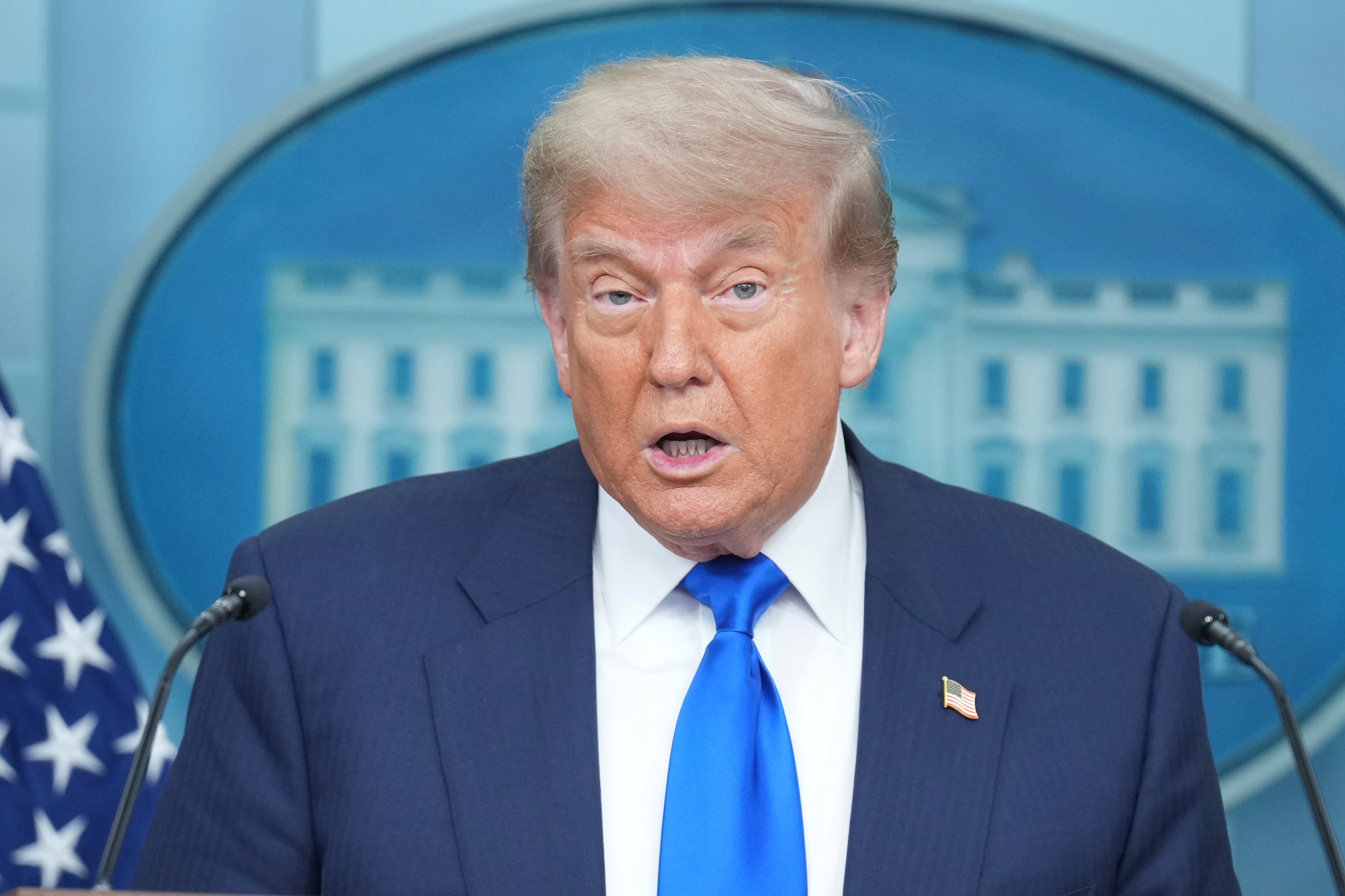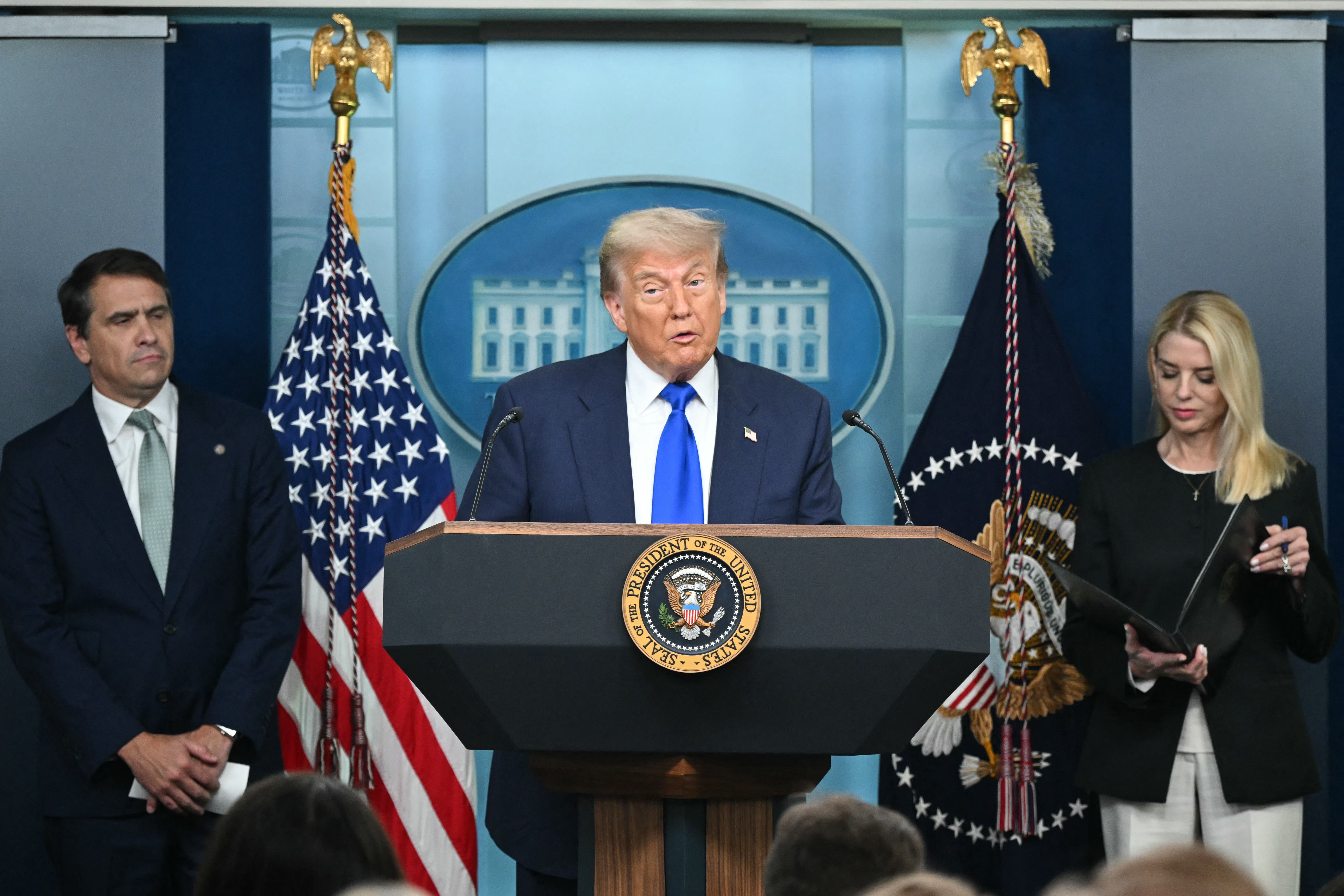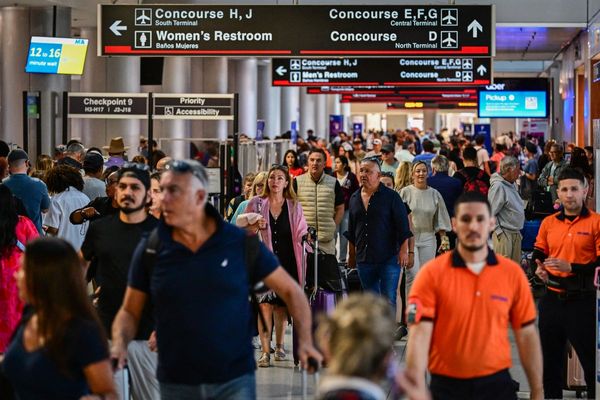President Donald Trump on Friday claimed a “giant win’ after the Supreme Court ruled that lower court judges may not issue nationwide injunctions in a ruling that emanated from challenges to his administration’s efforts to block children born in the United States to immigrant parents from receiving citizenship.
Trump saw the moment as so monumental that he quickly organized a press conference from the White House briefing room, only his second there since being reelected, to proclaim that the court had handed down “a monumental victory for the Constitution, the separation of powers and the rule of law.”
And he told reporters the decision was even “bigger than trade deals,” which have been the lynchpin of Trump’s controversial economic policy.
The victory lap followed close on the heels of the Supreme Court's conservative majority stripping federal courts’ authority to issue nationwide injunctions that have blocked key parts of Trump’s agenda.
Friday’s 6-3 ruling, written by Trump appointee Justice Amy Coney Barrett, states that federal judges went too far blocking his executive order that seeks to unilaterally redefine who gets to be a citizen. Those nationwide injunctions “exceed the equitable authority that Congress has given to the federal courts,” according to the ruling.

In a posting on his Truth Social before addressing the press, Trump wrote that it was a “GIANT WIN” for his administration. “Even the Birthright Citizenship Hoax has been, indirectly, hit hard. It had to do with the babies of slaves (same year!), not the SCAMMING of our Immigration process,” he wrote.
Speaking before a packed briefing room and television networks that took him live across the country, the president claimed a “handful of radical left judges” had been trying to “overrule the rightful powers of the president to stop the American people from getting the policies that they voted for in record numbers” and called the actions of those lower courts “a grave threat to democracy,” using language that mocked Democrats’ arguments that his authoritarian style of governance represented a threat to America’s 250-year-old experiment in democratic rule.
“Instead of merely ruling on the immediate cases before them, these judges have attempted to dictate the law for the entire nation ... this as a colossal abuse of power, which never occurred in American history prior to recent decades, and we've been hit with more nationwide injunctions than were issued in the entire 20th century,” he said while flanked by Attorney General Pam Bondi and Todd Blanche, Bondi’s deputy who previously served as Trump’s personal attorney.
Trump also said the ruling would let the administration “file promptly” to move forward on “numerous policies” that have been “wrongly enjoined” by district courts, including “ending sanctuary city funding, suspending refugee resettlement, freezing unnecessary funding, stopping federal taxpayers from paying for transgender surgeries and numerous other priorities of the American people.”
For her part, Bondi said the court’s decision would allow Americans to “finally [get] what they voted for” by preventing “rogue judges” from “striking down President Trump's policies across the entire nation” and accused the district courts of acting as “the imperial judiciary” by giving “relief to everyone in the world, instead of the parties before the court” in cases challenging Trump’s orders.
“These injunctions have blocked our policies from tariffs to military readiness to immigration to foreign affairs, fraud, abuse and many other issues. The judges have tried to seize the executive branch's power, and they cannot do that no longer,” she said.

“These injunctions have allowed district court judges to be emperors. They vetoed all of President Trump's power, and they cannot do that. This has been a bipartisan problem that has lasted five presidential terms, five different presidents, and it has ended today.”
Blanche, a former federal prosecutor who gained Trump’s favor by serving as his defense attorney in the multiple criminal cases filed against him during his time out of power, said the decision marked “a great day for the rule of law.”
“It's a great day for the Justice Department, and it's one that's been a long time coming, and one that that every American should have been waiting for with bated breath,” said Blanche, who accused the district judges who’d ruled against the administration of having done so “because they just simply don't agree with the administration's decision about a policy.”
The 6-3 ruling, issued along partisan lines and written by Trump appointee Justice Amy Coney Barrett, states that federal judges who had issued such injunctions went too far in blocking his executive order that seeks to unilaterally redefine who gets to be a citizen by exceeding “the equitable authority that Congress has given to the federal courts.”
It did not address the question of whether Trump can block citizenship from newborn Americans who are born to certain immigrant parents.
Instead, the court’s majority sided with arguments advanced by Solicitor General John Sauer, who called the “cascade of universal injunctions” against the administration a “bipartisan problem” that exceeds judicial authority.
More than half of the injunctions issued over the last 70 years were against the Trump administration, according to the Harvard Law Review, as Trump pushed the limits of his authority.
In Trump’s first term in office, his administration faced 64 injunctions, compared to 14 injunctions against Joe Biden and 12 against Barack Obama
The second administration faced 17 within its first two months.
In cases across the country, plaintiffs have pushed for those temporary orders as a tool for critical checks and balances against an administration that critics warn is mounting an ongoing assault against the rule of law.
And in response, the administration used the case not necessarily to argue over whether he can change the 14th Amendment but to target what has become a major obstacle to advancing Trump’s agenda: federal judges blocking aggressive executive actions.
Yet Trump, while addressing reporters, continued to falsely claim that the court had given its’ imprimatur to his birthright citizenship order.
He argued that the Supreme Court’s century-old precedent granting citizenship to anyone born here save for the children of diplomats and those born to members of invading armies, mischaracterized the intent of the 14th Amendment’s provision that “all persons born ... in the United States” were citizens by not limiting its application to the descendants of persons who’d been born into slavery prior to the American Civil War.
Without offering evidence, he also suggested that drug cartels and criminal gangs were somehow using birthright citizenship to “get very bad people” into the United States.
“They used birthright citizenship, some of the worst people, some of the cartels, to get people into our country, just so you know,” he said.
“I came along and we looked and we said, Wait a minute, this is wrong. We've been looking at birthright citizenship wrong for years.”
Supreme Court allows parents to opt children out of classes that use LGBT-inclusive books
Supreme Court bans anyone under 18 from viewing pornography in Texas
Trump’s $30B pitch to get Iran back in negotiations after ‘demolition’ of nuclear sites: report
USNS Harvey Milk is renamed after a WWII sailor in the latest Pentagon diversity purge
CNN host’s warning over Trump outrage at nuclear strikes reporting







